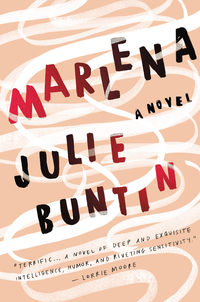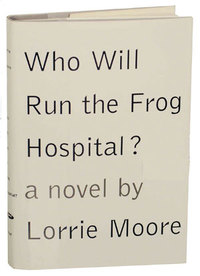Our series of guest posts by contemporary writers returns with a contribution from Julie Buntin, whose debut novel Marlena was published earlier this month by Henry Holt and Company.

Set in Buntin’s native northern Michigan, Marlena is the story of fifteen-year-old Cat, who has to contend with reduced circumstances and a move to a rural town after her parents’ divorce. She quickly becomes friends with her neighbor and fellow teen Marlena, little realizing that their fraught relationship is going to have consequences that will continue to haunt her decades later.
Writing in the April 23 New York Times Book Review, Deborah Shapiro greets Marlena as a “generous, sensitive novel of true feeling” and “a painful exorcism and a devoted memorial to friends and selves who are gone.”
Below, Buntin pays tribute to the 1994 Lorrie Moore novel that was crucial to her development as a writer.
Lorrie Moore’s Who Will Run the Frog Hospital? is 147 pages long. Every time I read it—I’ve lost track of how many—it feels like discovering a new book, and over and over again I’m stunned by how vividly, and in how few pages, it captures the potency of girlhood and the way those years can reverberate through an entire life.
I read it first as a teenager attending a boarding school I felt sure had made an egregious error in letting me in, let alone in granting me a scholarship. Mornings, at dawn, I’d sneak out of the dorms and down to a picnic table on the lakeshore to smoke and read—it was too early to get caught, and I liked reading in the blurry space between night and day. I finished Who Will Run the Frog Hospital? on one of those mornings and looked up to find the sun rising on a changed world, every tiny detail a little sharper for my brain having been dunked in Moore’s sensibility. There was humor in the half-buried stick in the sand, in the way someone had carved NO into the table wood and then crossed it out. I wanted to see like her. I even wanted to sound like her. The book hit me on the level of music, as poetry so often did (the sentences!), but there was story, too. Berie and Sils were girls I knew, but they were drawn in language so bright and unfamiliar and precise that even their nonsense songs seemed important. As a teenage girl who, like Berie, felt “something deeply sad had been born buried in me, stirring occasionally inside like a creature moving in sleep,” by extension, I felt important too. As if a girl sitting on a picnic table with a stolen pack of cigarettes could be the hero of a novel. Hell, maybe she could even write one.
Influence is a tricky thing. I think it starts with love, with resonance, with the exhilarating feeling that what you’ve read articulates something you’ve always felt but never had the words for. It’s reading something and jumping into the conversation to say, yes, it was this way for me too. Yes, and. The and is the writing. The and is the book that is your answer. There are details and moments in Marlena I hadn’t even realized I’d borrowed—a family of French Canadians, for example—and there are also more direct links. I remember knowing I wanted to write a scene where the girls just laugh, really hard, and for no good reason, and when I wrote it I thought of Berie and Sils as much as I thought of moments in my own adolescence when my best friend raising her eyebrow could make me sick with laughter. And writing about memory by structuring a book as a series of memories: I looked closely at Who Will Run the Frog Hospital? to try to figure how to do that, how the transitions might work, how to hide the seams.

Structurally, Who Will Run the Frog Hospital? breaks many of the rules upheld in my MFA program. It is essentially an interrupted flashback, triggered by a Proustian bite of brain in a Parisian café. Berie, our narrator, is abroad with her husband, a man who is both pathetic and a little menacing, their marriage essentially dead-ended. She starts the book in pursuit of memory—she’s trying to find the vivid core of her life, to figure out how and where she lost it. From Paris, the story toggles back to Berie’s fifteenth year, to her friend Sils, to the summer they spent working at Storyland, an amusement park in small-town upstate New York. Flashbacks, I’d been told, were very very bad and should be avoided at all costs. They had no action, they were boring—indulgent even, and lazy.
And yet, Who Will Run the Frog Hospital? was fast-paced and moving—I could see that it was the sentences that made it so, the urgency and emotion of the voice. Maybe my teachers weren’t always right—maybe good writing got that way by following its own internal logic. Both of these realizations were almost as freeing as reading Who Will Run the Frog Hospital? in the first place. One teacher believed Who Will Run the Frog Hospital? should have been a short story set in Paris with no girlhood scenes at all—I couldn’t believe how completely this brilliant man had missed the point. The teenage friendship between two girls who are not very exceptional, two girls who make some mistakes and learn some things and then grow up and away—that wasn’t a distraction from a more interesting story, that was the story. That was the vivid core of the narrator’s life, as it is for many women, as it was for me.
When I was finally ready to write a novel, when I thought about what I wanted to say, I thought about that girl sitting on the picnic table, how deeply she felt and how afraid she was to use her voice. I thought about being a teenager, about my friendships in those years. Wiggling out of a bedroom window, storms of laughter and sleepovers that lasted weeks, all that luxurious, menacing boredom, how terribly vulnerable we had been. I thought about how nothing has ever felt quite as bright and potent as that time, and how I’ll never get back there.
Who Will Run the Frog Hospital? gave me permission to try.
Now a resident of New York City, where she teaches fiction at Marymount Manhattan College, Julie Buntin hails from northern Michigan. Her writing has been published in The Atlantic, Slate, Electric Literature, and One Teen Story, among other outlets, and she is also the director of writing programs at Catapult.



